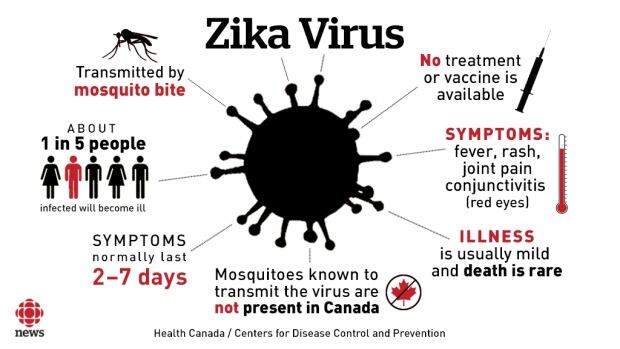Zika virus outbreak an emergency, World Health Organization says
[for more details& news visit http://toplivenews.net/]
The World Health Organization has declared the mosquito-borne Zika virus outbreak in the Americas a public health emergency.
- Zika timeline: A look at how the mosquito-borne virus spread
- Zika virus: What Canadian travellers need to know
Labelling the Zika threat a "public health emergency of international concern" is meant to prioritize resources immediately to curtail further spread.
On Monday, WHO director general Dr. Margaret Chan said the potential link between Zika virus and clusters of babies with microcephaly — an unusually small head that is associated with incomplete brain development — warranted the declaration because of its heavy burden on families and communities.
"After a review of the evidence, the committee advised that the clusters of microcephaly and other neurological complications constitute an extraordinary event and public health threat to other parts of the world," Chan said.
WHO officials say it could be six to nine months before science proves or disproves any connection between Zika and the spike in the number of babies born in Brazil with abnormally small heads.
Chan said she made the decision based on advice of experts who weighed information from Brazil, the United States, El Salvador and France, which reported on a similar cluster in French Polynesia in 2014.

Aedes aegypti mosquitoes sit in a petri dish at the Fiocruz institute in Recife, Pernambuco state, Brazil. The mosquito is a vector for the proliferation of the Zika virus spreading throughout Latin America. (Felipe Dana/Associated Press)
No recommendations were made to restrict travel or trade.
Instead, Canadian and U.S. authorities advise pregnant women outside the affected countries to consider delaying travel to the region. Prevention of mosquito bites, especially in pregnant women, is key.
Standard mosquito precautions for Zika virus include wearing long sleeves and pants, using repellents and keeping windows and doors closed to keep out the day-biting mosquitoes.
"We need co-ordinated international response to make sure that we get to the bottom of this," Chan said of the growing evidence on microcephaly.
The emergency declaration is focused on proving whether the clusters of microcephaly and neurological concerns are related to Zika virus infection or not, said Prof. David Heymann, chair of WHO's emergency committee.
Heymann stressed the virus is harmless to most other people.
Brazil Health Minister Marcelo Castro said Monday that about 80 per cent of people infected by the Zika virus so far haven't developed significant symptoms. Most symptoms are mild, and include fever, rash, headache, muscle and joint pain, and conjunctivitis (red eyes).
As of last week, Brazil has 4,000 suspect cases, of which 270 have been confirmed as being microcephaly with evidence of congenital infection, said Dr. Bruce Aylward, WHO's assistant director general.

Mosquito precautions are important to stem the spread of Zika virus. (CBC)
The United Nations health agency faced sharp criticism for its response to the Ebola outbreak in West Africa. Despite dire warnings that Ebola was out of control in mid-2014, WHO didn't declare an emergency until August, when nearly 1,000 people had died.
"Can you imagine if we do not do all this work now and wait until the scientific evidence comes out, then people will say, why don't you take action because the mosquito is ubiquitous," Chan said.
Such emergency declarations are rare. The H1N1 flu pandemic and polio are other previous examples.
Dr. Ross Upshur of the University of Toronto's department of family and community medicine was part of WHO's expert panel on using experimental treatments for Ebola.
For Zika, it will take concerted efforts to tidy up the environment, control mosquitoes and invest in basic public health and primary care in areas of extreme poverty, Upshur said in an interview.
"Address the root causes, and you will start to see less of this emergence of newer viruses in urban populations and elsewhere," Upshur said.

No comments:
Post a Comment